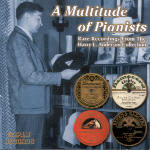Harry L. Anderson (1910-90) was a pianist, teacher, record collector, and ardent scholar of all things pianistic. His collection (now part of the International Piano Archives at the University of Maryland, College Park) encompasses every stylistic nook and cranny of classical pianists on disc, from celebrated artists to obscure yet historically significant names. Drawing from this collection’s riches, A Multitude of Pianists gathers 52 performances by 24 pianists from the 78 era. Five of these recordings have previously appeared on CD, while most of the others are reissued for the first time.
Anderson himself leads off the roster with his only commercial recording: two fetchingly played Medtner miniatures, followed by Paderewski at his controlled best in Chopin-Liszt and Schubert-Liszt. Among the noted teachers, the clear, limpid fingerwork of Xaver Scharwenka (his own Polish Dance and the Chopin Fantasy-Impromptu), Mieczyslaw Munz (Scriabin and Ravel), and Tobias Matthay (his own music) contrast to Alexander Michalowski’s flamboyant overhauling of Chopin’s Minute Waltz and a blazing, incisive Bach Chromatic Fantasy and Fugue from Richard Buhlig (who taught Anderson as well as John Cage).
While pianophiles might be familiar with Josef Hofmann’s golden, elegantly spun Rubinstein Melody in F (from a 1923 Brunswick 78), a rare 1929 Moriz Rosenthal Chopin C-sharp minor Waltz (never reissued before) scores over this great Liszt pupil’s better-known HMV traversal. Another important Liszt pupil, Eugen D’Albert, made his records long after he had given up piano practice to compose. While his abbreviated Chopin A-flat Polonaise is a mess, he acquits himself well in a selection from his own Capriolen (one of them borrows from “Dixie”, of all things!). Contrary to Harold C. Schoenberg’s claim, the eccentric Vladimir de Pachmann’s Chopin/Godowsky Revolutionary Etude (for left hand alone) is not “weird and pathetic”. To be sure, many of Mark Hambourg’s recordings make him out to be the Ed Wood of the piano, but not the Chopin, Rachmaninov, and Scriabin gems here.
I suspect that even the most hard-core piano mavens will not have heard, let alone heard of, people like Yolanda Mero, whose rip-roaring account of Vogrich’s demented Staccato Caprice goes to the head of the (good) party record list. George Liebling’s Liszt La Campanella, however, provides one of this set’s few instances of unqualified mediocrity. But the extensive and informative annotations by Gregor Benko and Donald Manildi are of the highest quality, and so are Seth Winner’s terrific restorations. Here’s something for the historic piano collector who has everything. (Available from International Piano Archives at the University of Maryland, Performing Arts Library, University of Maryland, College Park, MD 20742.)
































